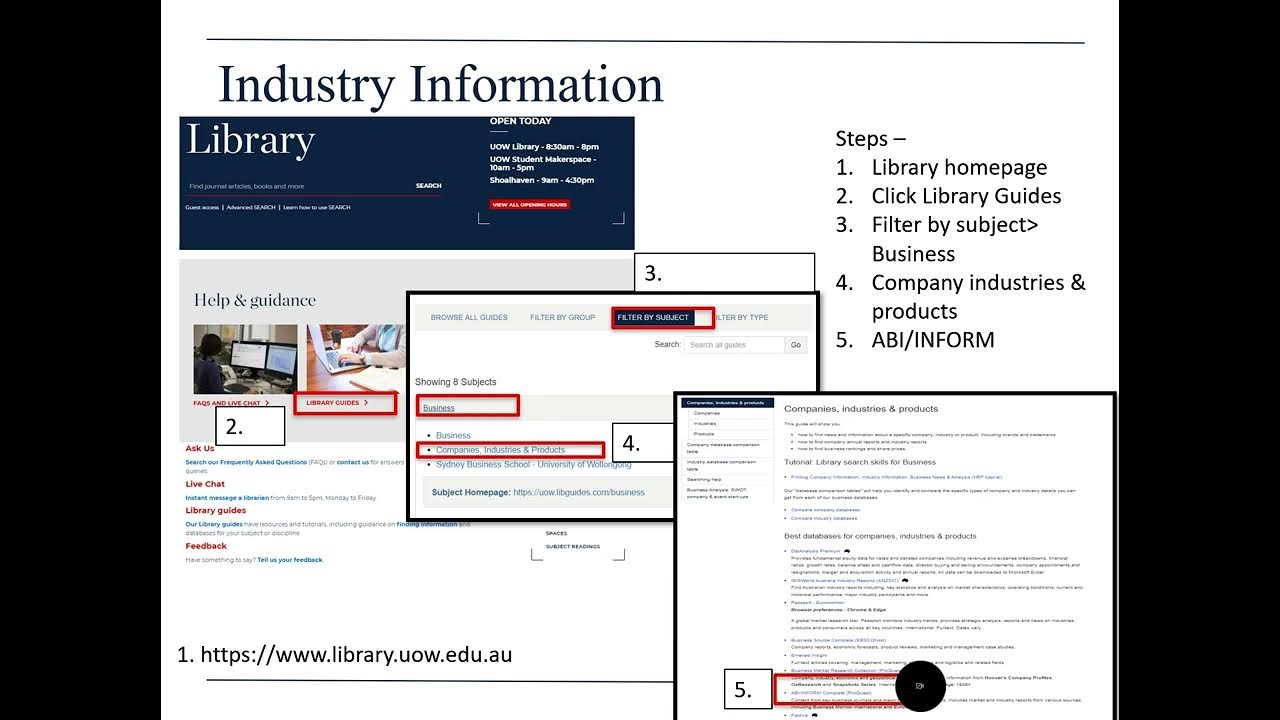Using a Library Database
Summary
TLDRThis tutorial explains how library databases support research by offering access to credible, reviewed sources, unlike the open, unverified information found on the Internet. It highlights different types of databases—general and subject-specific—and discusses various content like articles, books, and multimedia. The tutorial also compares browsing, searching, and advanced searching in these databases, guiding users on how to narrow down results. Emphasizing the advantages of using databases, it encourages students to access these resources remotely through their library’s website for quality research materials.
Takeaways
- 😀 Library databases provide access to a variety of reliable resources like articles, images, books, and videos.
- 😀 These databases are curated and reviewed by experts, ensuring the information is credible and accurate.
- 😀 The content you find in library databases is the same as the content published in physical magazines and newspapers.
- 😀 Unlike the internet, where anyone can post anything, library database content undergoes editorial review, enhancing trustworthiness.
- 😀 Information in library databases can be more specific and relevant to your research topic compared to the broad, unsorted data found on the internet.
- 😀 Searching the internet may provide up-to-the-minute news, but library databases offer well-vetted and factual content that may take longer to update.
- 😀 Many library databases are free to access, as schools and libraries pay for them, unlike the majority of internet content that is freely available but often unverified.
- 😀 Library databases often have categories to help you browse topics, making it easier to start research when you're unsure of your specific topic.
- 😀 The search function in databases allows you to narrow down results based on keywords, topics, publication titles, and more, making research more efficient.
- 😀 Advanced search features allow you to filter results by criteria such as publication date, document type, or reading level, offering even more precise control over your research.
- 😀 You can access library databases remotely, but you'll usually need to log in with your school or library credentials for off-campus access.
Q & A
What is the main purpose of a library database?
-The main purpose of a library database is to provide access to a wide variety of credible, professionally reviewed resources, such as articles, books, images, audio, and video, which can help in research for academic and personal interests.
How does a library database differ from information found on the Internet?
-Information in library databases is reviewed by experts or editors, adding credibility. In contrast, the Internet allows anyone to post content without a formal review process, which can lead to unreliable or unverified information.
Why are some sources in library databases more reliable than those on the Internet?
-Sources in library databases have typically gone through a professional editorial process, ensuring they are fact-checked and reviewed by experts. In contrast, much of the content on the Internet is not reviewed and may not be reliable.
What types of content can you find in a library database?
-A library database includes articles, books, images, newspapers, magazines, and sometimes audio or video content, all organized by topic for easy access.
What are the main types of databases available?
-There are general databases that cover a wide range of topics and specialized databases that focus on specific subjects like history, health, or science.
What are the three main options for searching a library database?
-The three main options for searching a library database are: Browse, Search, and Advanced Search.
What is the Browse option in a library database?
-The Browse option allows you to explore broad categories of topics and gradually narrow down your search to find specific subjects, making it useful when you're still deciding on a topic.
How does the Search option work in a library database?
-The Search option allows you to enter specific keywords or topics directly into the search box to find related resources in the database.
What is the benefit of using the Advanced Search option in a library database?
-The Advanced Search option allows you to refine your search by applying specific filters, such as keywords, publication type, date, or reading level, enabling a more targeted and efficient search.
Why do library databases cost money, and how do students access them?
-Library databases cost money because they provide professionally curated content that requires payment to access. Students can use these databases for free through their library’s website, often by logging in with their school username or library card number.
Outlines

Этот раздел доступен только подписчикам платных тарифов. Пожалуйста, перейдите на платный тариф для доступа.
Перейти на платный тарифMindmap

Этот раздел доступен только подписчикам платных тарифов. Пожалуйста, перейдите на платный тариф для доступа.
Перейти на платный тарифKeywords

Этот раздел доступен только подписчикам платных тарифов. Пожалуйста, перейдите на платный тариф для доступа.
Перейти на платный тарифHighlights

Этот раздел доступен только подписчикам платных тарифов. Пожалуйста, перейдите на платный тариф для доступа.
Перейти на платный тарифTranscripts

Этот раздел доступен только подписчикам платных тарифов. Пожалуйста, перейдите на платный тариф для доступа.
Перейти на платный тарифПосмотреть больше похожих видео
5.0 / 5 (0 votes)






